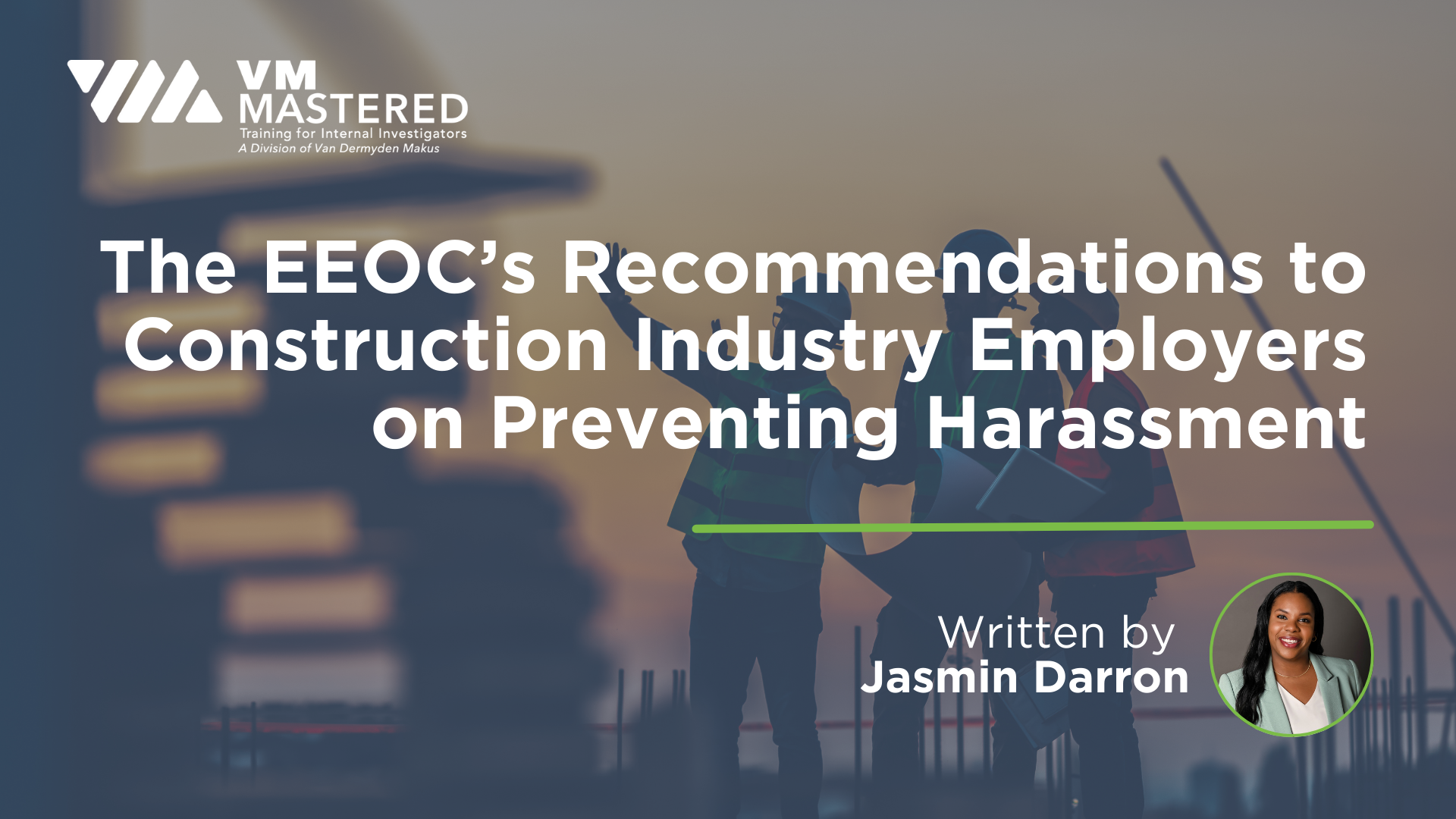The Equal Employment Opportunity Commission (EEOC) has scrutinized the employment practices of the construction industry over recent years, so much so that on June 18, 2024, the EEOC published Promising Practices for Preventing Harassment in the Construction Industry. As the title says, this publication is targeted toward employers and other leaders within the construction workforce. The publication provides recommendations to reduce the prevalence of harassment in those workplaces. One key element is the EEOC’s recommendation that general contractors take a more active role to support anti-harassment efforts on construction sites. For example, the EEOC encourages general contractors obtain feedback from workers through “anonymous worker surveys.”
The EEOC outlined several concerns that led it to provide the guidance. The EEOC maintains a Strategic Enforcement Plan (SEP). The purpose of the SEP is to establish a plan to “stop and remedy unlawful employment discrimination,” consistent with the EEOC’s mission. After receiving feedback from the public, including attorneys, human resources representatives, and unions, about employment issues including discrimination and harassment, on September 21, 2023, the EEOC released its updated SEP, referred to as the Strategic Enforcement Plan for Fiscal Years 2024-2028.
In this SEP, the EEOC identified concerns within specific industries, including the construction industry. One of the concerns is the continued underrepresentation of women and workers of color. These concerns led to the creation of Promising Practices for Preventing Harassment in the Construction Industry. In this guidance, the EEOC noted the prevalence of workplace harassment, including “the most egregious incidents” it investigated, occurred within the construction industry. The EEOC explained:
The nature of the construction industry includes a number of risk factors that may increase the likelihood of harassment, including workforces that are primarily male, workplaces where there is pressure to conform to traditional stereotypes, and decentralized workplaces. These factors may be exacerbated by the presence of multiple employers on a worksite, and the cyclical, project-based nature of construction.
The EEOC continued to note that harassment on construction sites presents workplace safety concerns because the nature of the work, which is potentially hazardous, is often performed by a team of workers. As a result of these findings, the EEOC developed practices to guide the construction industry on how to mitigate and address harassment.
A “committed and engaged leadership” and “consistent and demonstrated accountability” are two of the five core principles the EEOC identified to successfully prevent harassment in the workplace. It recommends that general contractors clearly and often communicate their anti-harassment measures to workers and obtain workers’ feedback about the work environment. According to the EEOC, general contractors can conduct “anonymous worker surveys” to achieve this. Such surveys – when well-designed and executed – can help the employer understand and improve workplace culture, gauge employee concerns about harassment, and address workplace concerns before they become bigger issues. Some key features of conducting worker surveys include:
- Crafting survey questions that are open-ended and qualitative in nature. Phrasing survey questions is no easy feat and should be handled cautiously to avoid leading questions and potentially skewing the results. Survey questions can include questions like:
-
- “Do you feel you have the support you need to perform your job?”;
- “What do you think are the strengths of your team?”;
- “What areas do you think the company should improve upon?”; and,
- “Do you believe you can provide open and honest feedback in response to this survey’s questions?”
Additionally, questions can ask workers to rate their work experience using numerical rating scales.
- Distributing the survey. The general contractor should decide who should conduct the survey and the way it is conducted. Depending on the aims of the survey or other business reasons, the general contractor may decide to have an independent, third-party conduct and distribute the survey to workers. No matter who conducts the survey, the individual should have the training and experience necessary to do so.
- Ensuring anonymity and preventing retaliation. Naturally, successful surveys require workers’ participation and honest responses. A way to achieve this is to ensure that workers believe they can provide truthful feedback without being retaliated against for doing so. The employer should take a few steps to ensure that employees remain anonymous in the process and communicate – more than once – to the workforce its policies on anti-retaliation.
- Analyzing the results and deciding next steps. This is a crucial step in the process. The employer needs to review the feedback its workers provide, and spot whether there are any concerns that need to be addressed. For example, a survey response could raise concerns about the occurrence of workplace harassment or other EEO-related issues, which would then trigger an obligation to formally investigate it.
When done correctly, anonymous worker surveys can successfully increase general contractors’ and other industry employers’ harassment prevention efforts. It is important to note that the Promising Practices for Preventing Harassment in the Construction Industry supplements the Enforcement Guidance on Harassment in the Workplace the EEOC released earlier this year. Construction industry employers must still follow current state, federal, and local anti-harassment and discrimination laws governing their employees and workspaces. We recommend construction industry general contractors evaluate their anti-harassment policies and assess their ability to implement anonymous worker surveys at construction sites. Taking proactive steps to prevent harassment and discrimination will reduce employment law liability and foster more productive and effective construction worksites.
Jasmin Darron is an Attorney Investigator for Van Dermyden Makus Law Corporation.
The foregoing is for informational purposes only and is not legal advice, nor should it be construed as such.


